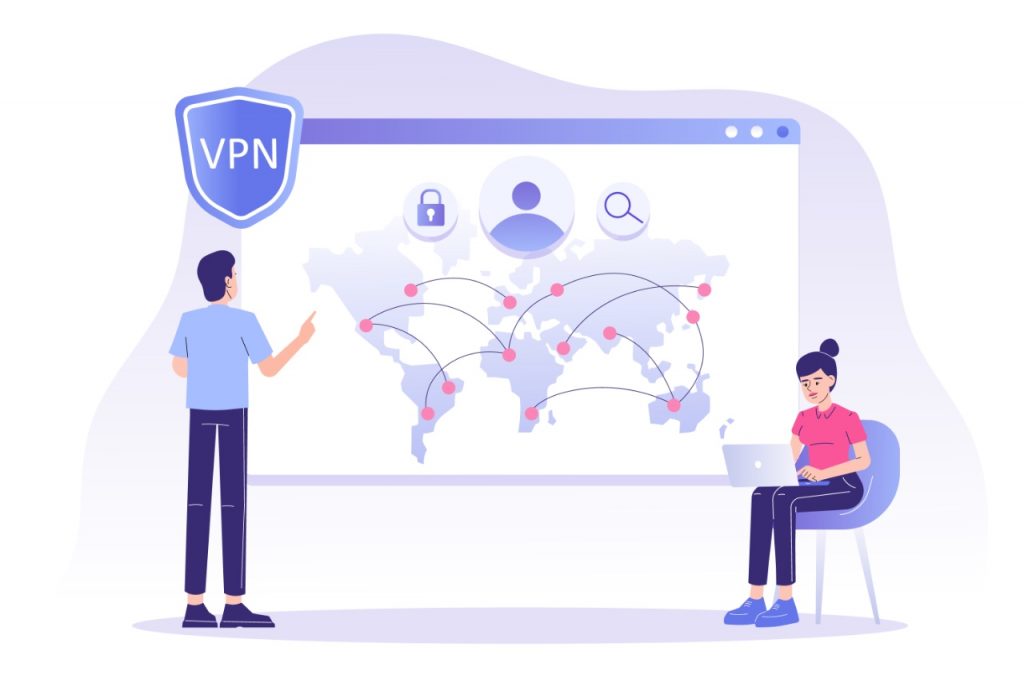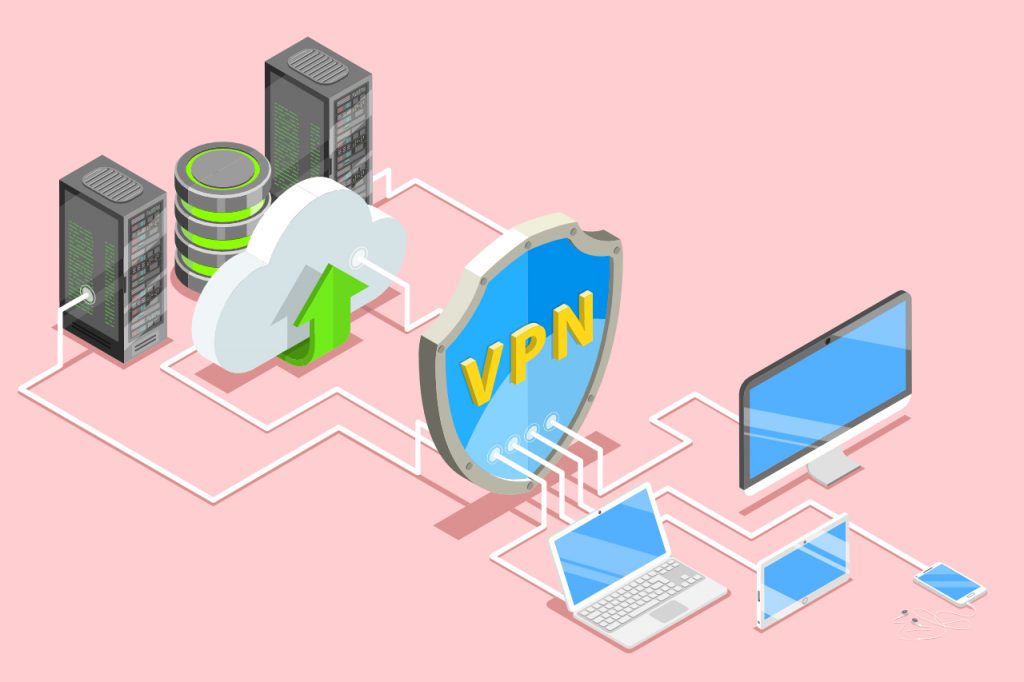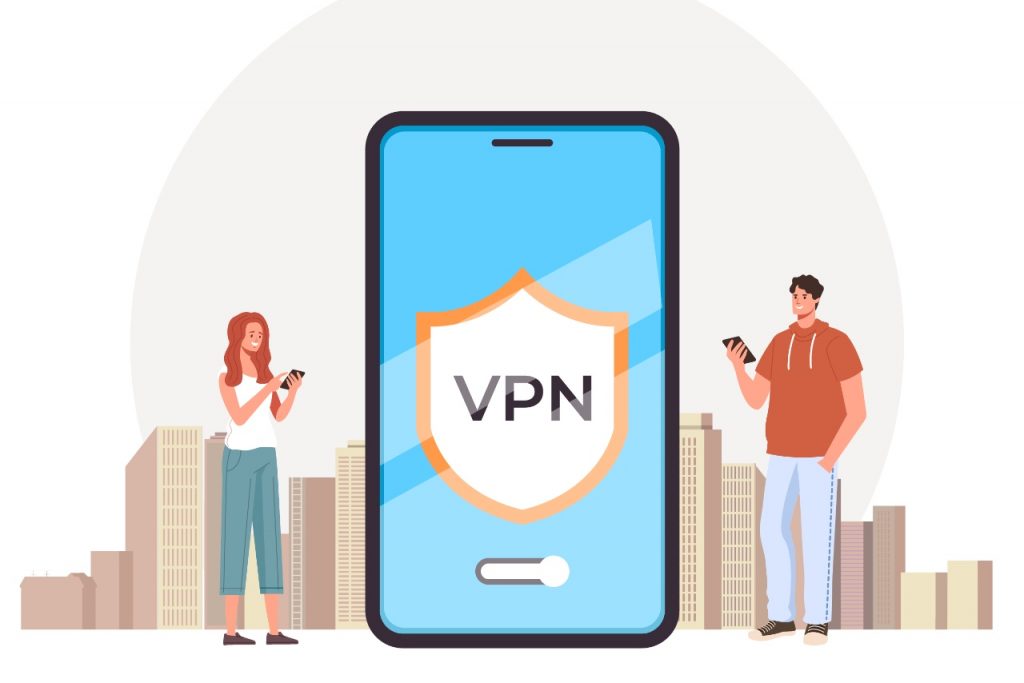Now you might be thinking of what a VPN is. Let’s first understand the answer to your question, what a VPN is.
What is a VPN?
A VPN (Virtual Private Network) is a network through which a person can secure access to a public internet connection. VPN offers both privacy and security features. These are the main benefits of a VPN service. It was developed to provide access to the resources to remote users and branches. Many corporations use it to protect their data. VPN hides your IP address and geographical location so that your online actions remain secure and hidden in this virtual world. It establishes a secure and encrypted connection, whether using private or public Wi-Fi, mobile hotspot, or broadband. A VPN helps in sustaining privacy and establishes anonymity. It uses an encrypted tunnel protocol to secure the connection. VPN provides access to the blocked websites to prevent geographical barriers by connecting to the servers and hiding a user’s identity and location to sustain anonymity on the internet. VPN provides a spoofed IP address to the subscribers from any city. For instance, you may live in India, but with a Virtual Private Network, you can appear to live in Singapore, the U.S., or any number of gateway cities. I hope now you might have understood what a VPN is. Now let’s know the benefits of VPN or the advantages it offers.
Advantages of VPN
Basically, there are two most important benefits of VPN, i.e., Privacy and Security. PRIVACY VPN enables the feature of privacy as it hides your IP address, geographical location, and internet search history, and many more things by sustaining anonymity and your identity so that the browsers and websites cannot track you and reveal who and where you are. SECURITY It is one of the essential benefits a VPN offers. Security is of prime importance for all. A VPN helps to hide and protect your personal or private information, i.e., your sensitive data sent or received by your device.
There are many more VPN benefits that it offers. The advantages of a VPN are as follows-
1. Hide your personal data
A VPN hides your personal information and data. As you all know, applications and websites keep a look and track your day-to-day online activities and analyze the data collected for different purposes. So, a VPN helps you and curtails websites from tracking and accessing your data to keep the information safe, secure, and anonymous that you are sending and receiving on the internet. It prevents others from accessing your information, and it may use 128 or 256-bit encryption to secure your data. Do you want to know what does a VPN hide from ISPs, government agencies, hackers, and marketers?
2. No data throttling
Data throttling occurs when your internet service provider intentionally slows down the speed of internet service. It is done to regulate network traffic and to maximize optimization. A VPN can help to escape data-throttling, i.e., maximize or increase data speed because you become anonymous to ISPs. As a result, ISPs don’t place the data cap to slow down your internet speed. Users can get maximum internet speed using a VPN service.
3. Prevent bandwidth throttling
Many times, you might have gone through the issues of a slow internet connection. There are many websites on which you might have noticed slow internet speed and also bandwidth throttling. This happens because ISPs have done it knowingly to regulate the network. A VPN can be useful as it can prevent someone from being indolent by providing encrypted internet traffic on your device. It also restricts others on the same network from seeing your sent or received data and know your location by sustaining anonymity and privacy.
4. Access region-restricted content
A Virtual Private Network helps you to access geographically blocked content, e.g., Netflix or other websites. It hides your IP address and geo-location. Your content provider thinks that you are accessing the content from a different location, and you get access to region-restricted websites. You should always check and agree to the terms and conditions of the services to get access. Remember that some countries charge penalties for using VPN when you do not follow and agree to their terms and conditions.
5. Bypass censorship when traveling abroad
VPN helps you to overcome geographical barriers by providing access to certain websites. A few certain countries don’t allow access to social media content or censored content. You can access this content using a VPN because it hides your real location from ISPs. You should always be alert and tactful that using a VPN is legal for getting access to certain restricted websites, and you should follow and comply with their terms and conditions of service. You should also know the country’s laws, rules, and regulations before using a VPN because its use is not legal in a few countries.
6. Watch region-blocked sports
One of the benefits of using a VPN is to access geographically restricted regional sports coverage unavailable in your location. For example, many television networks or websites do not provide access outside a specific country. You can certainly get access and view them from your location if using a VPN. It helps to make the impossible possible. Don’t forget to keep in mind your video streaming service’s terms and conditions and follow the country’s laws to avoid penalties. Some countries impose penalties or fines if you do not adhere to the rules of using a VPN.
7. Buying cheap tickets
You can buy cheap flight tickets using a VPN as you all know that every reservation center and airline operator charges varied prices for different countries. If you want to get a cheap flight ticket, you need to search for a state with a low cost of living, compare the price of a ticket with your residence, and then connect through a VPN to reduce the cost of tickets. It is a beneficial feature of a VPN to get a cheap ticket easily in no time. The same applies to other rental services and internet services.
Benefits of a VPN to Businesses
8. Use local broadband as a leased-line
A VPN is one of the cheaper leased-line alternatives which can help business concerns to save money. For example, many businesses can overcome and boycott, taking costly network connections on a monthly rental to connect different offices situated in different regions. Using a VPN, they can connect through cheaper broadband or local leased lines with local internet service providers’ help. So, therefore a VPN cuts costs and grants saving.
9. Reduce long-distance phone charges
A VPN generally helps to offer cheap long-distance telephone charges. You can use your local ISP access points to access your company’s intranet instead of remote access servers and a dial-up connection. It helps in reducing overall expenses by cutting rates.
10. Provide network scalability
A VPN helps provide network scalability, which means that when business leads to expansion and growth, it needs a secured connection, thereby increasing the cost of building a secured private network connection. VPNs help businesses opt for existing network lines and capability by getting better reach to international locations and servers.
11. Fewer support costs
A VPN helps in curtailing support costs. Organizations can reduce the cost of server maintenance. A hired third-party service provider can support a lower cost structure, thus lower expenses. It is all because they have many clients. It will help businesses in cutting-down support costs. Apart from these benefits of a VPN, it also has certain disadvantages.
Disadvantages of VPN
Cheap or Free VPN services come with many drawbacks. Disadvantages of using VPN are as follows:
1. Slow internet speed
You may get slow internet speed sometimes while using a VPN because it encrypts and reroutes your internet connection. So, this is one of the VPN drawbacks.
2. Banned in some countries
For using a VPN, you always need to be alert and tactful to check the bylaws, rules, and regulations of the location because its usage is banned and prohibited in some countries. So, don’t forget to check the legislation or be ready to pay the penalty.
3. May difficult to set up sometimes
A VPN set up and the establishment is not always easy. It isn’t easy to set up sometimes, depending on the variability. Always be alert to choose a newbie easy to set up VPN service, which does not pose the problem of setting it up.
4. Encryption quality
One of the VPN drawbacks can be its encryption quality. You must be able to identify what kind of encryption is being used by your VPN service. We recommend opting for a VPN with military-grade encryption (AES 256-bit encryption). Only it can protect you from hackers and snooping ISPs. Also, your VPN service should not log your online activities. You can read reviews before buying a secure and effective VPN, which helps to get good encryption.
5. Only a paid VPN is better
There are many free VPN services available, but they may not grant complete protection or security. However, using them is not a smart choice just because they are free and show unwanted ads. But still, if you choose to use them, then your privacy might be at risk. So, the best option is to opt for a paid VPN service to enjoy complete security and protection. It is why VPN service might not be reasonable for everyone as they charge a subscription fee per month. The price of a VPN service increases with the quality of service. These were certain disadvantages a VPN has.
How to Choose a VPN?
It is not complicated to choose a reliable VPN service. Free VPN services don’t offer all the required features as per their customer’s needs. The best and reliable VPN will basically depend on your choice and on what amount you would likely agree to pay. Free VPNs will not offer complete security and protection, as told earlier. If VPN providers do not charge any subscription fee, they may attain costs through advertising or by collecting and selling your private data to third parties, which in turn will lack security and privacy. You need to go for a paid service to take the complete benefits of a VPN. So, it is better to choose a paid VPN, pay a subscription fee so that you can ensure your data and information are safe and secure. Opting for a reliable VPN gives you the chance to add extra privacy to your online tasks. A good VPN should offer a secure connection that will keep your information safe from any other person and cybercriminals who might pose a cyber attack threat. It is essential to choose a good and reliable VPN if you love to maintain your privacy and security and not want to get your information tracked or leaked by cybercriminals. You can enjoy the numerous benefits of a VPN after choosing a reliable VPN for security and privacy.
Features of a VPN
VPN offers 128 or 256-bit encryption. No logs policy. This feature increases goodwill and loyalty. You can use a VPN on more than one machine or device. It offers many server locations to choose from, i.e., it offers a wide variety. It provides DNS leak protection, which means whenever you lose connection, a reliable VPN help to make your information safe and secure if your VPN connection drops.
Conclusion
To conclude, I would like to say that a better VPN has ended all the worries of people regarding the safety, security, and privacy of the information and data. Many people are finding ways to get rid of being getting tracked during their online activities and tasks. VPN is the best option as it helps to protect your activities from being tracked by cybercriminals and internet service providers. It is always beneficial to go for a paid VPN to get good connectivity, speed, safety, and security. A paid VPN provides protection and saves you from cyber-attacks by cybercriminals. Co-author– Ms. Manpreet Kaur


